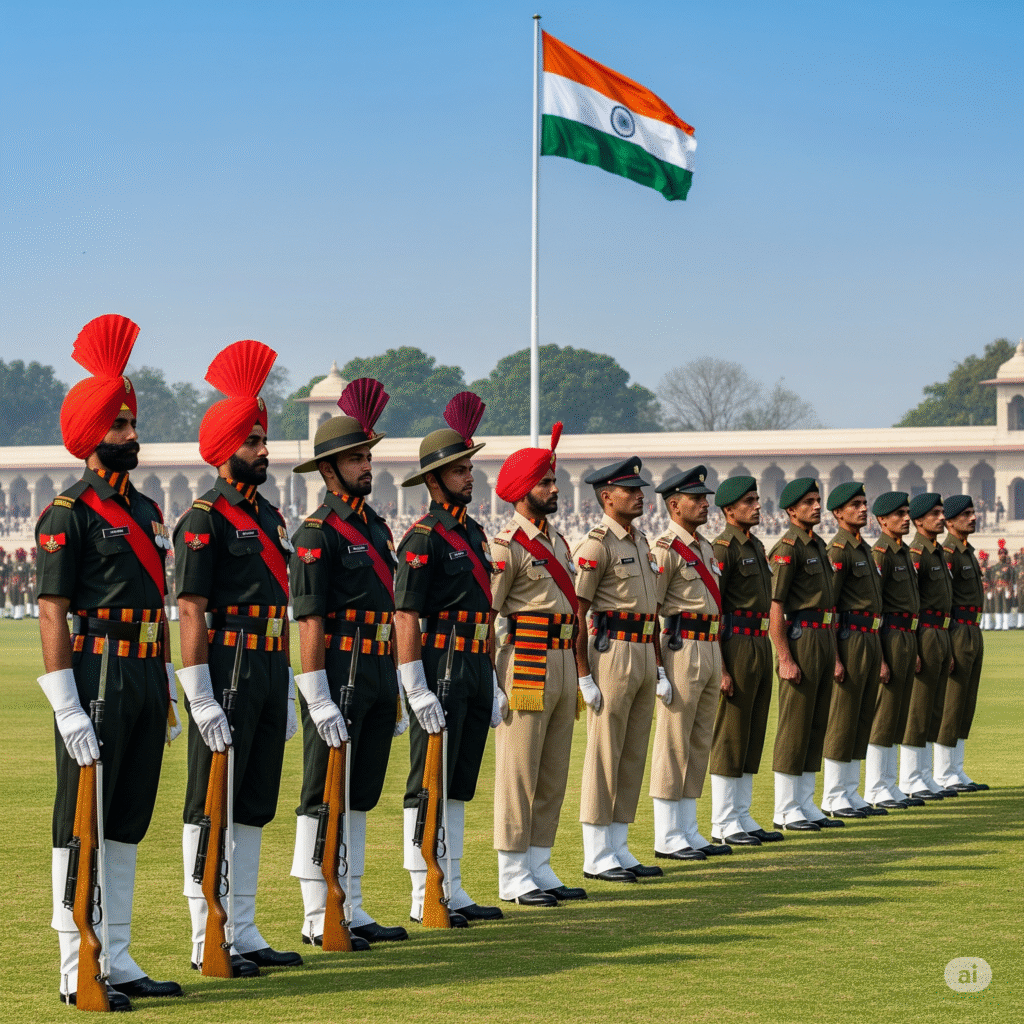Defence Jobs in India: Complete Guide to Army, Navy, Air Force & Defence Research
Updated: August 2025
Defence careers offer prestige, job security, and a chance to serve the nation. This guide is a single reference for people seeking defence jobs in India — from school-leavers aiming for NDA to engineers targeting DRDO or technical entries in the services. Bookmark this page and use the links to dive deeper into each topic.
Why Choose a Defence Career?
Defence careers combine public service with stable employment, structured progression, and benefits like pension, medical coverage, housing, and training. Beyond pay, many choose the forces for discipline, adventure, and leadership development.
Major Forces & Organisations
- Indian Army — land operations, largest force with combat and technical roles.
- Indian Navy — maritime security, ships, submarines, and naval aviation.
- Indian Air Force — air defence, fighters, transport and technical wings.
- Central Armed Police Forces (CAPFs) — BSF, CRPF, CISF, ITBP, SSB (internal security & border roles).
- Coast Guard — coastal security and SAR (search & rescue).
- DRDO, ISRO, Defence PSUs — research, development and engineering careers (scientist, engineer, apprentice).
Main Entry Routes & Eligibility
Entry routes vary by education and age. Below is a concise snapshot:
| Candidate | Common Entry Options | Typical Age |
|---|---|---|
| After 10+2 | NDA (Army/Navy/Air Force) | 16.5–19.5 years |
| After Graduation | CDS, AFCAT, SSC, CAPF AC | 21–26 (varies) |
| Engineering Graduates | SSC Tech, TES, GATE/DRDO entries | up to mid-20s |
| Diploma/ITI | Tradesman, technical staff | varies |
Key Recruitment Exams
- NDA (UPSC) — for Class 12 entrants to Army, Navy, Air Force (written + SSB).
- CDS (UPSC) — for graduates to join IMA, INA, AFA, OTA.
- AFCAT — Indian Air Force officer entries (flying, technical, ground).
- CAPF AC (UPSC) — Assistant Commandant recruitment for CAPFs.
- INET & Navy Entries — technical and officer entries for Indian Navy.
- DRDO / Defence PSUs — apprenticeship, scientist, and engineer recruitments (portal notifications).
Physical & Medical Standards
Physical fitness and medical fitness are essential. Typical requirements include:
- Minimum height and proportionate weight (varies by service and role).
- Vision standards — combat roles demand high visual acuity (6/6 or 6/9 often required).
- Endurance tests — timed runs, push-ups, long jump and other physical trials.
- Medical board clearance for chronic conditions and fitness.
Salary, Perks & Career Growth
Officers start at pay levels defined by the pay commission (basic pay ranges with allowances). Perks include housing or HRA, free/subsidised healthcare, canteen facility, pensions, travel concessions, and generous leave policies. Career growth follows cadre-based promotions, command postings, and specialist roles.
How to Apply: Practical Steps
- Identify the correct official portal for your target force (UPSC, joinindianarmy.nic.in, joinindiannavy.gov.in, careerindianairforce.cdac.in, drdo.gov.in).
- Read the notification carefully for eligibility, syllabus, and application windows.
- Prepare scanned documents: educational certificates, ID proof, photos.
- Complete the online application and save the confirmation. Pay attention to fee rules and deadlines.
- Prepare for written tests and SSB/physicals simultaneously; schedule mock tests and physical training.
Preparation Tips & Resources
- Plan early: Start physical training and basic academics months before the exam.
- Mock tests: Solve previous-year papers for NDA, CDS, AFCAT and time yourself.
- SSB practice: Focus on group tasks, personal interview, and psychological tests.
- Study resources: NCERT for basics, standard prep books for reasoning, GK updates from reputable sources, and DefenceNiti’s exam guides.
- Consistency: Balanced routine with fitness, study, and rest beats last-minute cramming.
Useful Official Links
- UPSC (NDA/CDS/CAPF)
- Join Indian Army
- Join Indian Navy
- Indian Air Force Careers
- DRDO Official Site
Conclusion
A defence career demands commitment, discipline and preparation — but it also returns a unique sense of purpose and stability. Use this page as your starting point: choose the right entry route, prepare steadily, and follow official notifications closely. DefenceNiti will keep this guide updated with the latest recruitment news and deep-dive resources.


